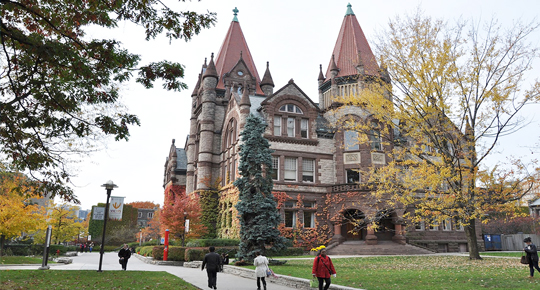Home
-
Study Destination
- CanadaPreparing for your future can be both a scary and exciting stage of your life. There are so many options and avenues to choose from! To broaden their horizons and experience something new, many students opt to study abroad. Out of all the many choices available to students, Canada comes out on top. In fact, the number of international students has risen dramatically over the last few years. Why the sudden infatuation with Canada and its maple leaf? Here are 7 good reasons to choose Canada for your studies.
Canadian college and university diplomas are recognized around the world. The Canadian educational system encourages cross-disciplinary studies and the development of transferable skills (e.g., critical thinking, teamwork and communications) and uses cutting-edge technology and digital media.

Five Canadian universities ranked in the 2018 top 100 for the best universities in the world according to the Times Higher Education World University Ratings.
Universities, colleges, and other postsecondary education institutions offer a range of programmes in a wide variety of purely academic and skill oriented professional and technical fields. Canadian universities offer more than 10,000 undergraduate and graduate degree programmes, as well as professional degree programmes and certificate courses. Students can also choose to pursue various workshops, short courses, and upgrades for skilled workers and professionals side by side to their main degree programme. Some institutions offer specialised courses from a wide range of fields like fisheries, agriculture, apiary, paramedical technology, etc. However, fields such as telecommunications, medicine, agriculture, computer technology, business studies, and environmental science are the most sought after by Indian students.
Tuition fees for foreign students in Canada are the lowest compared to the US, UK, and Australia. The average cost for a foreign student for one year in an undergraduate programme is CAD 11, 903. Fees for bachelor’s degrees at the US public universities are almost 1/3 higher than Canadian universities. Compared to private universities in the US, fees in Canadian universities for undergraduate programmes were found to be less than half.
The Canadian government offers a work program to students who have obtained a diploma from a post-secondary school in Canada and are looking to gain work experience. This is an excellent way to continue to live in Canada while diversifying and developing your professional skills.
According to QS World University Rankings, three Canadian cities, Toronto, Montreal and Vancouver, made the list of the top 50 student cities. The ranking was based on several criteria, including affordability, the diversity of the student population, and employers’ perception of graduates on the job market.
Canada boasts an enviable quality of life, with a cost of living (e.g., housing, transportation, tuition) that is lower than in other countries, such as the US, France and the UK, and offers safety, stability and respect for the rights of individuals and communities.
Canada has a highly diverse population, resulting in a rich and vibrant cultural scene. Canada is a country of immigrants and follows a policy of fostering multicultural diversity. The Canadian society comprises of almost all of the world's ethnic groups. You will easily find most ethnic foods and cultural activities. You will easily find informal clubs and associations representing various ethnicities. People of Canada are generally very open minded and respectful of different perspectives. Over the past century and a half, Canada has welcomed 15 million immigrants. Canada is also home to over one million aboriginal people, including First Nations, Métis, and Inuit communities.
Canada is an extremely vast country: Its surface area is the second largest in the world. It offers a multitude of magnificent landscapes that can be explored throughout the country’s four distinct seasons. Many Canadians complain about the country’s harsh winters, but the cold season provides an opportunity for dedicated skiers and ice skaters to practice their sport in majestic surroundings. Here are just some of the most scenic places to visit: the pristine beaches of Prince Edward Island, the impressive fjords of the Saguenay and the Percé Rock of the Gaspé in Quebec, the fascinating Rockies and Lake Louise in Alberta, Niagara Falls in Ontario, Jasper National Park also in Alberta and Whistler Mountain in British Columbia. From the sea to its mountains, prairies and forests, Canada is an endless source of natural beauty!
For international students, very few places offer the advantages that Canada does. Its universities, among the best in the world, are at the heart of its rich and diverse culture. Canada is a country with an excellent standard of living and where there are many opportunities to get some experience in your field of studies. As a bilingual, safe and welcoming place, Canada won’t disappoint students who are looking to broaden their horizons…

Canada has a strong and well-funded system of public education, largely managed provincially. Consequently, some aspects of the education system can vary between provinces. However, as education is overseen by the federal government, the standard of education remains consistently high throughout the country. There is both a public and private education system in Canada. The Canadian government heavily subsidizes education from kindergarten through to the post-secondary level, spending on average almost six percent of its GDP on education. This means Canada spends proportionately more on education than the average among OECD countries.

There are 163 recognised public and private universities and 183 recognised public colleges and institutes in Canada. These include the ones granting applied and bachelor's degrees. In addition, there are 68 university level institutions and 51 college level institutions recognised as authorised institutions. These institutions, however, offer a few selected programmes that are approved in accordance with the provincially established quality assurance programmes.


Canadian universities, mostly, invite and accept applications individually, which can be found and completed online on their websites. However, some provinces have a centralized application system for universities, such as the Ontario Universities Application Centre (OUAC). You can apply to multiple universities by means of a single application through these platforms. Deadlines for applications are generally later than other countries. Applications do not open until October and deadlines range from January to June. Many universities have multiple start dates too. While September is usually the start date, many universities start accepting applications in January or even May. You must track the important dates of individual universities to avoid losing out on options.
Students won’t see any shortage of shopping malls, art galleries, theaters, cafeterias, and exhibition hall in the urban areas. Canadian cities and towns are rich in open to public gardens, beaches, parks, sports and leisure facilities. Students can also indulge in a number of cultural festivals like the sounds of the Calgary Stampede, Montreal International Jazz Festival, enjoy an NHL match, and many others. One of the most important reasons why you should study in Canada is because of its welcoming and heartwarming environment. Canada is a peaceful country and is considered very safe for living. The crime rate in the country has declined over the years. Safety of students is something very important in the country. Most of the universities keep the campus security on during the whole day.

All universities in Canada have 24×7 campus security which includes security patrol cars and campus security office is always there to solve students grievances. Certain universities have also instigated the ‘Walk Safe’ programme, in which the students can easily get access to public conveyance during late night hours. The Canadian Automobile Association (CAA) provide roadside assistance if your vehicle breaks down while driving in Canada. All Cabs in Canada have assistance information found in the backseat. Also, as per United Nations, Canada is among the top 10 countries to live in the world.
Copyright @ 2020. Designed and Developed by Montech Design